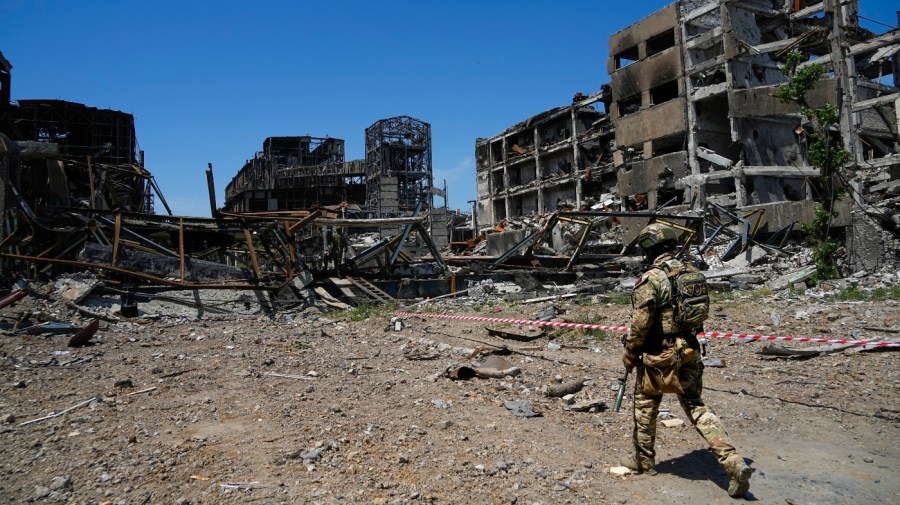Mariupol refugees of Russia’s war tend to their own in Odesa
ODESA, Ukraine — The staff at the “Me Mariupol” refugee center knows what it’s like for survivors from one of the cities most devastated by Russia’s assault on Ukraine — all of them are from there, too.
“The main thing is not only to provide practical assistance and aid, like groceries, but to help Mariupol feel comfortable in Odesa, connect with them as former neighbors and show them around and make them feel like home,” said Serhii Marchuk, the head of the center and himself an internally displaced person (IDP) from Mariupol.
Marchuk, 40, evacuated from Mariupol in April, driving through Russia, Latvia, Lithuania and Poland and then back to Ukraine, traveling with his wife and two children, aged 8 and 3.
It took nine days and 5,000 kilometers, he told The Hill through a translator last week.
The children are fearful of thunderstorms, he said — it reminds them of the bombing.
In his previous life he worked in Mariupol under the mayor, Vadym Boychenko, and his current position as head of the center in Odesa is an extension of that work.
Scattered across their own country
The center, one of 11 across Ukraine catering to and staffed almost exclusively by IDPs from Mariupol, opened around a month ago.
Marchuk said he chose to settle in Odesa because its position along the Black Sea reminded him of his home city, which is on the coast of the Sea of Azov.
The Odesa center, an initiative of Boychenko’s, according to Marchuk, is housed in what once was a school.
NGOs and aid agencies who help support it are listed on a posterboard on the entrance — including the Ukrainian government, Save the Children, World Central Kitchen, the Danish Refugee Council and local Odesa businesses.
The building is clean and bright, sparsely decorated with a display spelling out the center’s intake process, including registration, medical exams and psychological evaluations, short-term child care and assistance to find housing, employment and groceries and other household items.
Marchuk said they have managed to register about 1,700 refugees from Mariupol, including 300 children under the age of 18. He estimates there are about 6,000 more refugees in the city of Odesa and another 3,500 in the greater region.

Sambina, a woman from Mariupol who arrived at the center on Thursday and only gave her first name, said she had seen it advertised on a Telegram channel. She called the center a relief, saying it is providing assistance so she can find more long-term housing for her family, including her husband, her husband’s brother and seven children aged 3 to 13.
“The main thing is we need help buying property or renting property,” Sambina says through a translator. “Everything else we can do by ourselves.”
“The children are the most important thing in my life,” she adds for emphasis about the need to find stable housing.
She left Mariupol in March after spending two weeks in a basement shelter surviving the Russian onslaught.
“We were very scared. The most important thing was to save the children. We saw a lot of dead people,” Sambina said.
Facing a new reality
Marchuk said the biggest issue they encounter is people who have yet to confront the reality that they have to start their lives anew.
“The biggest psychological problem is that they’re still living there,” he said. “They are distraught, they lost their property, their jobs, savings and family. In this center, we want to help them start over, but it’s hard for these people.”
The lobby of the center displays “Before and After” images of Mariupol that show the city as it is now, completely destroyed from the Russian siege, and images showing a hopeful future of rebuilding it if Ukrainian forces can succeed in ending the occupation of the city.
“When the center opened, people came here and they started crying when they saw these photos because it hurt them so much,” Marchuk said, adding that “every person that comes from Mariupol understands the name of our problem. … Its name is [Russian President Vladimir] Putin; he’s evil and he causes a lot of trouble for us.”
Still, Marchuk said people are optimistic.
“Everybody still believes that victory will be on our side and they’ll go back to Mariupol, rebuild it and make it Ukrainian.”
In the meantime, he hopes that the center, which is currently funded through December, can provide a sense of community for the IDPs.
“The first, and most important thing, when Mariupol people come here, they feel normal. Because they see people who are also from Mariupol. They were living in the same city, they were shopping in the same places — they can understand each other, they speak in one language,” he said.
“Sometimes people come here, and they don’t even need anything, they just come here, maybe just searching for connection, community. One woman, she came here and she was sitting for more than an hour. I came and asked her, ‘Maybe I can help you, do you need something?’ And she said, ‘No, I’m just waiting — maybe somebody will come here who I know.”
The Hill’s Laura Kelly is on assignment in Ukraine.
Copyright 2023 Nexstar Media Inc. All rights reserved. This material may not be published, broadcast, rewritten, or redistributed. Regular the hill posts







